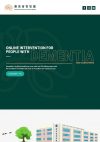The Alzheimer’s Society is calling on local authorities to make personal budgets dementia friendly and break down barriers to access
According to the Alzheimer’s Society, deep-seated misconceptions around personal budgets and dementia are preventing local authorities from delivering person-centred care.
The charity say that fewer than a third of people receiving social care support for memory and cognition problems have a personal budget. The Care Act gives everyone who is receiving support from social services the legal right to a personal budget, but currently the system does not appear to be living up to the government’s aspirations for person-centred social care. Previous research from the Society has shown that most people with dementia would like to stay independent for as long as possible, and this may only be possible with access to a personal budget.
An Alzheimer’s Society audit of local authorities’ personal budgets processes shows that many are failing to make people with dementia aware of their right to a personal budget. Despite clear benefits, comparatively few people with dementia have a personal budget and face significant barriers when trying to access them.
“Personal budgets are essential to delivering person-centred care, giving people with dementia choice and control over the care and support they receive,” said George McNamara, Head of Policy at Alzheimer’s Society.
“People with dementia and their families tell us of the very real impact personal budgets have had on their lives – from the 85-year old woman who returned home after being left alone in her care home room each day with no way of communicating, to the husband and wife who are now able to go dancing in Blackpool dance hall each week.”
Sign the Dementia Friendly Personal Budgets Charter
The Alzheimer’s Society has now produced a guide for councils which describes easy and cost-effective actions to ensure personal budgets are dementia friendly, and is urging all local authorities with adult social care responsibilities to sign the Dementia Friendly Personal Budgets Charter as a sign of their commitment.
The charter is being launched today at the National Children’s and Adults’ Services Conference 2016.
Pledges in the Dementia Friendly Personal Budgets Charter include:
- Producing relevant and clear information on personal budgets for people with dementia that always explain all the available options and methods for receiving a personal budget
- Training all staff involved in care and support planning in the personalisation agenda to ensure accurate and appropriate information is provided at all times
- Having a timely and transparent assessment process that clearly explains how they have decided on the amount of money a person will receive
- Collecting robust data on the uptake and outcomes of personal budgets for people with dementia so that services are continuously improved
“This deep-seated misunderstanding – that personal budgets aren’t appropriate for people with dementia – is preventing local authorities from truly delivering person-centred care,” added George McNamara in a press statement. “Of the few people with dementia who have a personal budget, fewer still receive direct payments – the vast majority have their payments managed by their local authority, meaning their choice of care provider is limited to those on an approved list.
“We need a sea change in the way local authorities provide personal budgets for people with dementia, from providing clear and accessible information to training staff to better understand how person budgets can work for people with dementia.”

























